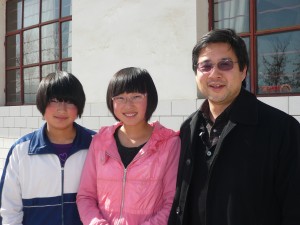
Albert Park with students Guan Guopan and Long Nan at Datong Township No. 1 Jr. H.S. (Photo courtesy Albert Park)
Season 8, Episode 17
This week on Freakonomics Radio, in our collective zeal to reform schools and close the achievement gap, we may have lost sight of where most learning really happens — at home. Dana Suskind of the Thirty Million Words Initiative works with parents in their homes to teach them the best ways of helping their babies learn language. Also, is there data that shows Sesame Street helps kids perform better in school?
Plus, most education reform addresses the supply side of the equation — that is, what should teachers and schools be doing differently? But this story is about the demand side, the students themselves. What if there were a cheap, quick, and simple way to lift some students’ grades?
That’s the question that drove two economists, Paul Glewwe at the University of Minnesota and Albert Park at Oxford, to conduct an experiment in a poor, rural province of China called Gansu. Glewwe and Park learned that, while 10 to 15 percent of the young students in Gansu had vision problems that could be corrected with eyeglasses, only two percent of the kids who needed glasses actually had them. In the show, you’ll hear about a) how effective the glasses were in raising test scores; b) the surprising fact that the take-up rate for the free glasses was relatively low, and possible explanations for this; c) how this intervention compares in efficiency and cost to the typical ed-reform interventions taking places around the world.
To learn more, check out the podcasts from which this hour was drawn: “Does ‘Early Education’ Come Way Too Late?” and “Smarter Kids at 10 Bucks a Pop.”
You can subscribe to the Freakonomics Radio podcast at Apple Podcasts, Stitcher, or elsewhere, or get the RSS feed.
Comments